Oprichnik Vasily Gryaznoy, ally of Malyuta Skuratov
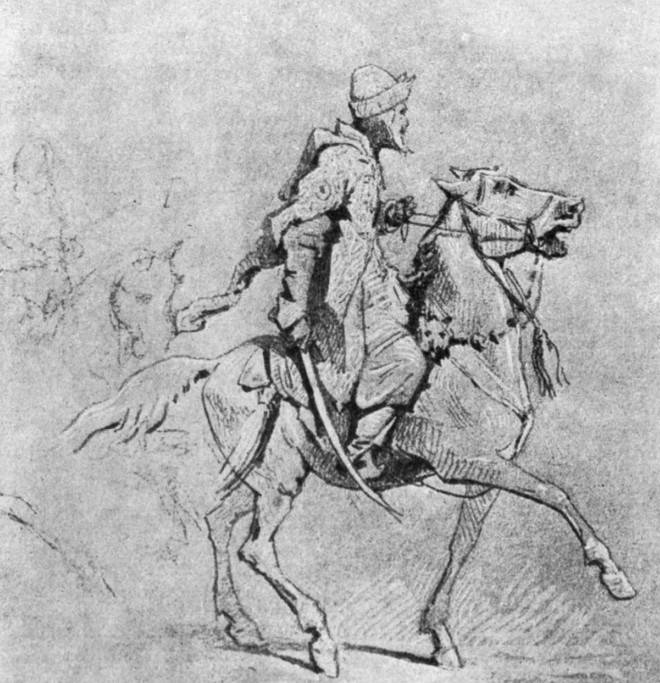
Oprichnik in the drawing by V. Schwartz
In the two previous articles, we talked about the famous guardsman Malyuta Skuratov. His colleague Vasily Gryaznoy (together they "dumped" other authoritative figures of the oprichnina - Alexei Basmanov, his son Fyodor and Prince Athanasius Vyazemsky) is much less known. But not everyone can boast of the fact that six people were “bitten to death”. Vasily Gryaznoy claimed that he succeeded.
Origin
The future guardsman was born into a not too noble noble family from the city of Aleksin. Like most of the genera included in the notorious "Discharge", the Ilyins-Gryaznovs attributed to themselves a foreign origin. This was considered prestigious, the same Romanovs, for example, claimed that their ancestor Andrey Kobyla came from Prussia. It is curious that his eldest son is known as Semyon Zherebets, and the youngest, who became the founder of the Romanov boyars, is Fedor Koshka. This gave Maximilian Voloshin reason to call the Romanovs "the offspring of the Cat and the Mare":
The throne of Moscow was being built,
When the offspring of the Cat and the Mare
Pozharsky led to reign.
The ancestor of the Gryaznovs, according to the “painting” preserved in the archives, which on May 18, 1686 was submitted to the Chamber of Genealogical Affairs under the Discharge Order, allegedly was a certain “Stenya”, who arrived in Rus' from Venice. Plausible information about this family dates back to the 1480th century: the grandson of this legendary "Stenya" - Ilya Borisovich, whose father served as the Rostov archbishops, entered the service of the Grand Duke of Moscow Vasily I (son of Dmitry Donskoy). Then he served Ivan III, in XNUMX his participation in the embassy of the Rostov Archbishop Vassian to the brothers of Ivan III, Andrei Uglitsky and Boris Volotsky, who started the rebellion, was noted.
The grandson of Ilya Borisovich - Grigory Vasilyevich Gryaznoy-Ilyin, was first in the service of Dmitry Ivanovich Uglitsky, then - with Vasily III, and finally, in 1519, he began to serve the brother of the Grand Duke - Andrei Ivanovich Staritsky. His son, the future oprichnik Vasily Gryaznoy, originally served in the city of Aleksin with the boyar Yu. not in the kennels."
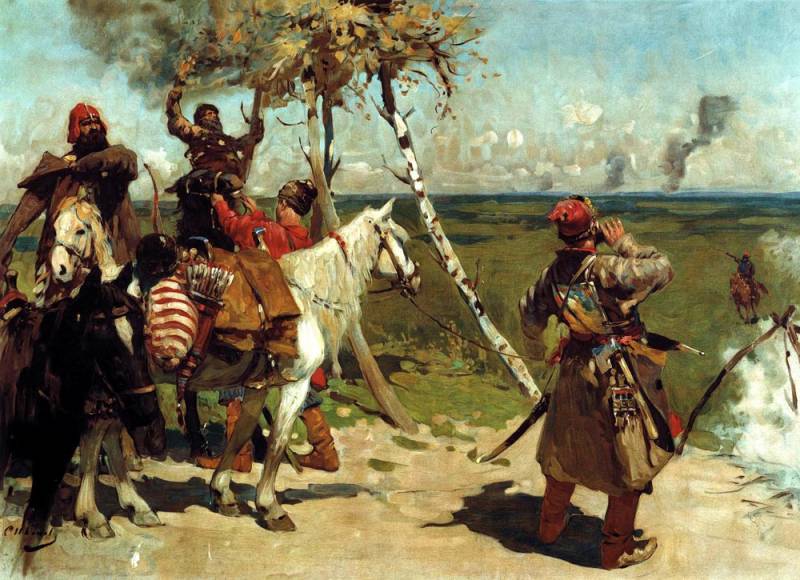
S. Ivanov. On the guard border of the Moscow State
Service in the oprichnina
Probably, Vasily Gryaznoy would have lived the usual unobtrusive life of a provincial nobleman if Aleksin had not become the oprichnina possession of Ivan IV. The tsar then exchanged possessions with his cousin Vladimir Andreevich: he took the Staritsky principality with the cities of Vereya, Staritsa and Aleksin, and gave Dmitrov to his brother. In 1566, Vasily Gryaznoy entered the service of the tsar, was enrolled in the guardsmen. In the same year, we see Gryazny as one of the guarantors for the oprichnina governors I. Okhlyabinin and Z. Ochin-Pleshcheeva - in the event of the escape of these disgraced boyars, the guarantors had to pay 4 thousand rubles to the royal treasury.
During the Livonian campaign of 1567, he was already one of the “heads” in the sovereign’s regiment - along with M. Skuratov and another future influential guardsman, R. Alferyev. Ivan the Terrible liked the cheerful and daring Vasily and was soon brought closer to him.
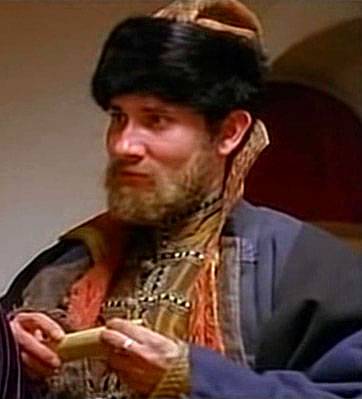
Vasily Gryaznoy performed by A. Serov-Ostankinsky in the series "Ivan the Terrible", 2009
It is known that on June 19, 1568, it was Vasily Gryaznoy, the gunsmith Afanasy Vyazemsky and Malyuta Skuratov who were sent by the tsar to “take away wives and daughters” from Zemstvo service people and merchants.
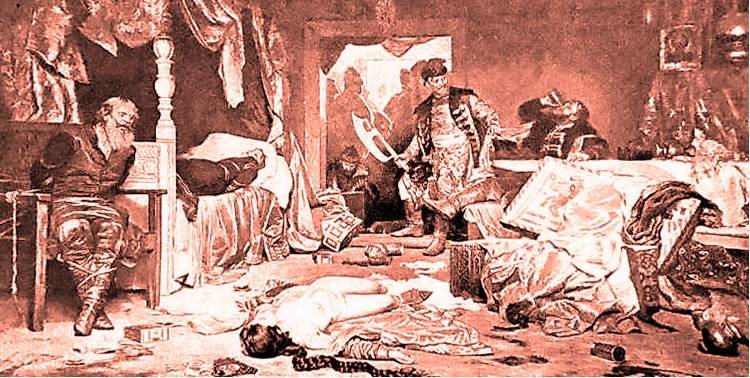
A. Novoskoltsev. Guardsmen in the boyar's house
Alexey Tolstoy in the novel “Prince Silver” puts into the mouth of boyar Morozov the following description of the hero of the article:
It is known that he was among the guardsmen who participated in the arrest of Metropolitan Philip.
In early October 1569, Vladimir (no longer Staritsky, but Dmitrovsky) was appointed commander of the troops sent to defend Astrakhan. However, he was soon summoned by the tsar to Aleksandrovskaya Sloboda, but on the way he was intercepted by a detachment of guardsmen led by Malyuta Skuratov and Vasily Gryazny, who read out the verdict:
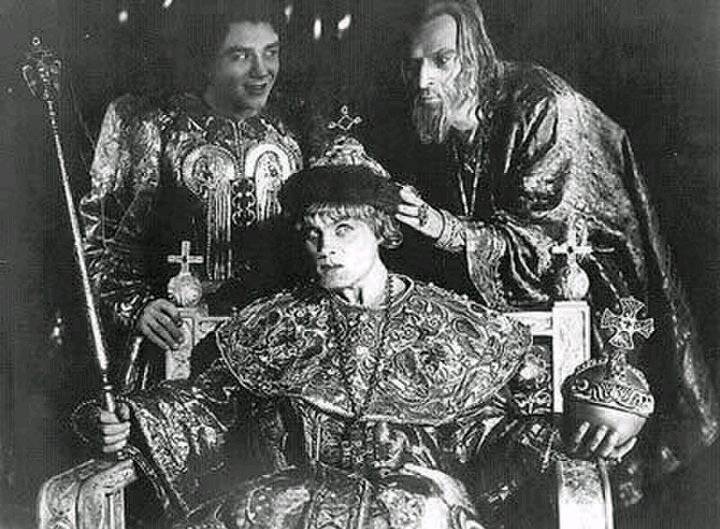
Vladimir Staritsky in the famous film by S. Eisenstein "Ivan the Terrible", 1944. Ivan the Terrible and Fyodor Basmanov stand behind
According to a widespread version, Vladimir was poisoned along with his wife Evdokia (sometimes they write that they were stabbed to death, shot with a squeaker, or their heads were cut off). They also talk about the death of two sons of Vladimir and his eldest daughter, as well as the murder of three priests, a clerk, a clerk and twenty servants from the prince's retinue. But it is known for sure that the son of Vladimir Vasily and one of the daughters were left alive. Vasily Vladimirovich was later even returned to his father's inheritance.
Then Vasily Gryaznoy took an active part in the campaign of the oprichnina troops against Novgorod and in the repressions against the conspirators.
After the arrest of the Basmanovs and Vyazemsky, it was Gryaznoy and Skuratov who took their place at the head of the oprichnina. In the same year, Vasily Gryazny was granted the rank of Duma nobleman "from the oprichnina".
In the spring of 1571, the Crimean Khan Devlet-Girey, a maternal cousin of the Ottoman Sultan Suleiman the Magnificent, marched on Moscow at the head of a 40-strong army.
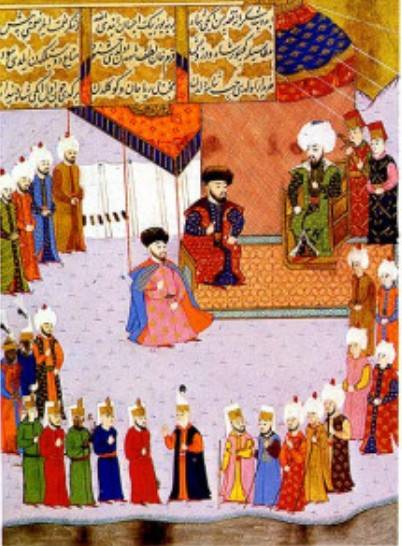
“Sultan Suleiman I receives the Crimean Khan Devlet Giray”, miniature of the XNUMXth century. from the book "Suleiman-name". Topkapi Museum, Istanbul.
Ivan the Terrible expected to meet his army at Serpukhov. Vasily Gryaznoy was then in the sovereign's army. However, the khan crossed the Oka near Przemysl, then crossed the Ugra and, having defeated the oprichnina detachment of Ya. Volynsky who met him, approached Moscow. On May 23, the Krymchaks won a clash with the army of governor I. Belsky, and on May 24, a fire started in Moscow, practically destroying the city. The Westphalian Heinrich Staden, who served in the oprichnina, writes about him as follows in “Notes on Muscovy” (“Country and rule of the Muscovites, described by Heinrich von Staden,” 1577–1578):
The exact number of victims of this fire is unknown, thousands of people died, including the governor Ivan Belsky. There was no one to deal with the burial, a huge number of corpses were dumped into the Moscow River, as a result, an epidemic began:
The results of this invasion of the Tatars were catastrophic. The Khan's ambassador in Warsaw stated that during the campaign of 1571, 60 thousand people were killed and the same number were taken prisoner.
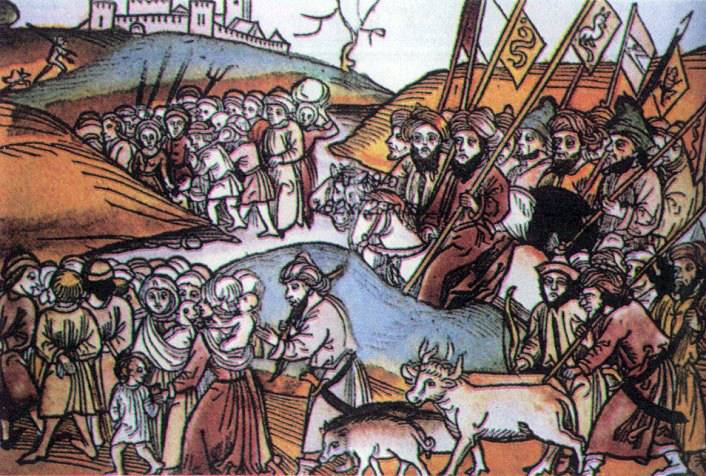
Tatars return to the Crimea with full, miniature of the XNUMXth century.
They say that it was then that Ivan the Terrible became disillusioned with the oprichnina army. Inspired by success, Devlet-Giray in 1572 tried to repeat his campaign against Moscow, but suffered a terrible defeat in the Battle of Molodi. Oprichniki (the regiment of Dmitry Khvorostinin) then for the first time fought not separately, but as part of the zemstvo army, obeying the zemstvo governor Mikhail Vorotynsky. It was Khvorostinin's guardsmen who were the first to enter the battle and led the main army to the hill, on which the walk-city was already deployed. The losses of the Tatars were so great that they were able to organize a new invasion of Rus' only after a new generation of combat-ready men had grown up - 20 years later, in 1591.
Cooling the tsar to Vasily Gryaznoy
Meanwhile, the influence of Vasily Gryazny on the king began to weaken. In November 1571, he was not invited to the wedding of the tsar with Marfa Sobakina, whom many know about from N. A. Rimsky-Korsakov's opera The Tsar's Bride. It was written based on the drama of the then popular Russian poet, translator and playwright L. A. Mey. Curiously, Rimsky-Korsakov had previously used another piece by May when writing the opera The Maid of Pskov. In the opera The Tsar's Bride (as in May's play), the oprichnik Grigory Gryaznoy is called the brother of the hero of the article, Vasily.

Grigory Gryaznoy (played by S. Toptygin) next to Dr. Elisey Bomelius on the stage of the Helikon-Opera theater
It is also curious that the role of Marfa was written “based on the voice and skill” of Nadezhda Zabela, the wife of Mikhail Vrubel, who became the model for his famous painting “The Swan Princess”.
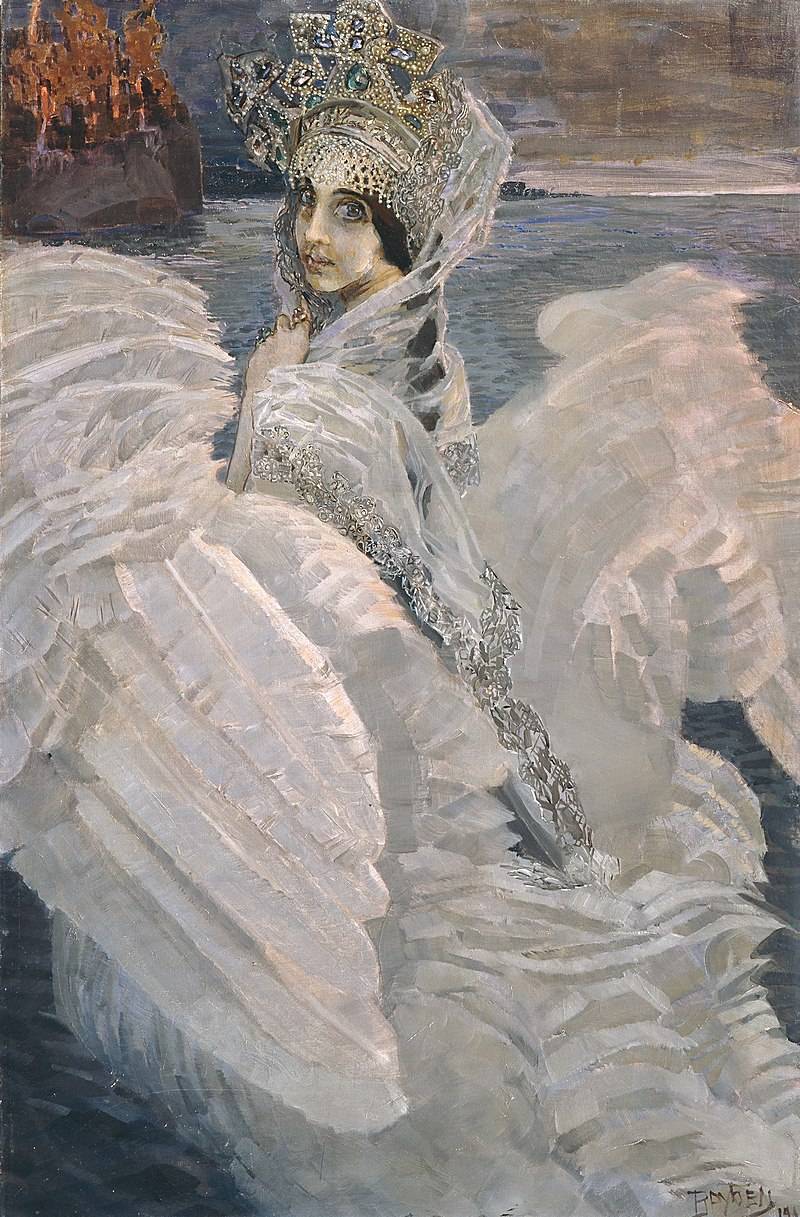
Nadezhda Zabela in the portrait of M. Vrubel
However, in the end, at the premiere (October 22, 1899, the theater of the Moscow Association of Private Russian Opera), this part was performed by another singer.
The new chosen one of Ivan IV, Marfa Vasilievna Sobakina, was the daughter of a Kolomna nobleman (who turned into a Novgorod merchant in the opera) and, according to some authors, a relative of Malyuta Skuratov. Three of her cousins served in the oprichnina. Father "not by birth" received the boyars, but later became a monk of the Kirillo-Belozersky monastery.
At the organized review of brides, the wife of the eldest son and heir to the king was also chosen - she became Evdokia Saburova. Soon Martha fell ill, the English physician Elisha Bomelius suggested that some kind of poison was the cause of her illness. On charges of poisoning her, among others, relatives of Vasily Gryaznoy were executed - cousin Grigory Menshoy Gryaznoy (the head and judge of the oprichny Zemsky court in Moscow) with his son Nikita, who was burned alive.
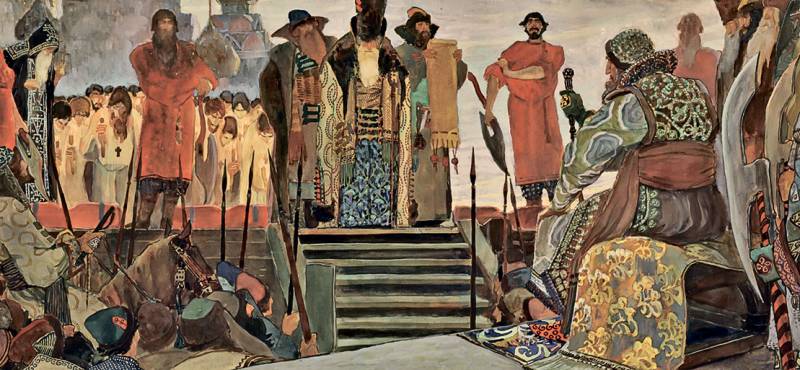
V. Vladimirov. Execution of the boyar
Ivan the Terrible, apparently, really fell in love with Marfa, since he nevertheless married a sick girl - on October 28, 1572. Vasily Gryaznoy was not invited to the wedding. Alas, Martha passed away on November 13th. Oddly enough, there were no special repressions. A month later, the Zemstvo and Oprichnina Dumas were united, and after the victory over the Crimeans and Turks under Molodi, a royal decree was issued banning the very word "oprichnina" from being mentioned.
Recall that it was not abolished, only the name changed: the guardsmen became "yard people." The tsar left the decision on the future fate of the "yard lands and cities" to the discretion of his sons - Ivan and Fedor: "as it is more profitable for them, they repair it."
At this time, the Muscovite kingdom waged a difficult Livonian war, which began in 1558. On December 27, 1572, the Russians besieged Weissenstein Castle between Narva and Revel (now the Estonian city of Paide). This fortress was taken on January 1, 1573. One of the assault detachments was led by Malyuta Skuratov, who was mortally wounded here. Another was headed by Vasily Gryaznoy, who, after the victory, was appointed governor of Narva.
Unsuccessful campaign of Vasily Gryaznoy
Soon the hero of our article received a new assignment - to the Donkov fortress, which protected the Russian borders from the attacks of the Crimean Tatars. Here Vasily Gryaznoy went on a raid through enemy territory to “get languages.” During this campaign, he was captured. Vasily later informed the tsar that his own subordinates had let him down. Here, for example, is what he writes about the sentinels:
Nevertheless, having defeated the Tatar detachment on Karachekra, he reached the Milky Waters River, which flows into the Sea of \u280b\uXNUMXbAzov. Vasily Stepanov, sent by him ahead, discovered about XNUMX Tatars and, according to the order previously given to Gryazny, retreated, leading them to the main detachment. Basil ordered his men to attack the enemy, but they chose to flee.
In a letter to Ivan the Terrible, Vasily complains that they:
Desperately resisting Vasily (according to him, he “bitten 6 people to death” and wounded 20) was knocked off his horse and taken prisoner. The tsar's ambassador to the Khan, Athanasius Nagoi, reports that Vasily Gryaznoy was brought to the Crimea seriously wounded - "slightly alive."
The conditions of Vasily's detention in captivity were very difficult: fearing escape, he was kept in chains, fed poorly. From the Crimea, he turned to the king with a request to ransom or exchange him. In the meantime, in his first letter he reported on the famine in the Crimea:
Ivan IV replied to his former favorite, and these letters are extremely curious documents of that era. Answering Vasily Gryaznoy, the tsar at first blames him for his carelessness:
You wrote that you were taken prisoner for your sins; so it was necessary, Vasyushka, not to drive around among the Crimean uluses without a way; and as soon as you drove in, you didn’t have to sleep like during a hunting trip: you thought that you had come to roundabout places with dogs for hares, and the Crimeans strapped you to the saddle. Or did you think that in the Crimea you can joke just like me, standing behind a meal? The Crimeans do not sleep like you, but they know how to catch you, sissies; they do not say, having reached a foreign land: "It's time to go home!"
If the Crimeans were such women as you, then they would not even be across the river, not only in Moscow.”
Then he reproaches Vasily that in captivity he declared himself a “big” and important person, because of which the khan now demands an exorbitant ransom - 100 thousand rubles, or to give him the captive Murza Divey:
About Murza Diveya, the king writes:
In a response letter, V. Gryaznoy writes to the tsar:
And he allows himself to reproach him:
And further:
Agree that this was written not by a slave, but by a person who knows his own worth, who feels unfairly offended and even offended.
He was especially stung by the comparison with a hare:
At the end of the letter, he entrusts himself to the royal mercy, expressing the hope that the king will not forget him.
Ivan IV nevertheless encouraged Vasily, informing him through the messenger I. Myasoedov that "the sovereign granted his son an estate and ordered him to arrange a monetary salary."
It is curious that in Crimea Vasily tried to act as a diplomat: he writes that Devlet-Girey consulted with him about the conditions for concluding peace between Moscow and Crimea, and he decisively rejected the idea of \u1578b\uXNUMXbgiving up Kazan and Astrakhan. And the khan even allegedly noted that Vasily "took a good deed upon himself." But Ivan IV did not appreciate these efforts of Gryaznoy and in XNUMX wrote to Devlet Giray:
Vasily Gryaznoy was redeemed in March 1577, the archives preserved the report of representatives of Ivan IV on "bargaining with the Tatars." The prisoner was brought in chains, but at the same time he participated in the negotiations. The Russian ambassadors, again, said that "Vasily is a young man" and the price for him is 200 rubles, but "on the occasion, at the government's approach", they can agree to a thousand. In the end, the parties bargained for the amount of two thousand rubles. Devlet-Giray wrote to Ivan the Terrible that he was going to release Gryaznoy after the ransom, giving him gifts, but decided to detain him until "as your ambassadors are great."
And some believe that, despite the ransom paid, Vasily Gryaznoy never returned home, remained in the Crimea - however, not as an ordinary, but as an honorary prisoner. And according to the official version, after returning, Vasily Gryaznoy managed the Shelon Pyatina for some time, lived the rest of his life on an estate near the city of Korchev, which ceased to exist in 1937 - was resettled during the construction of the dam of the Ivankovsky reservoir and the Moscow-Volga canal.
His son, Timofey Vasilyevich Gryaznoy, received an estate from Ivan IV for his father’s “complete patience.” Then he served Boris Godunov. During the Time of Troubles in 1610, he participated in a conspiracy against Vasily Shuisky, which ended with the overthrow of this king. He recognized False Dmitry II as sovereign and received from him the rank of okolnik, but then swore allegiance to the Polish prince Vladislav. During the Polish occupation of Moscow, he was in charge of the Monastery Prikaz. The Romanovs deprived Timofey Gryaznoy of his ranks and estates.
And his son Boris in 1634, during the Smolensk War, fled from the army to Lithuania, where his traces were lost.
Information